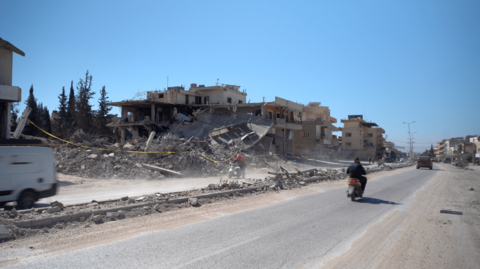The Child of a Long Night

The call came at 3:00 a.m.
A mother’s voice, frantic, barely holding back sobs. Her child was struggling to breathe. She knew no one. She trusted no one. She had my number, and she called.
I got to her as fast as I could. She clutched her child tightly to her chest as we rushed to the emergency room. In the dim hospital lights, I saw the exhaustion on her face. She was beyond desperate.
“I was a school principal,” she told me, her voice trembling.
I built a life on structure, discipline, understanding. Now, nothing makes sense. I can’t process what is happening. I don’t know anyone here. I don’t know where to go. My child is sick, and his doctors in the Bekaa… they’re gone. Nowhere to be found.
She didn’t cry. She was too numb for that.
She told me about her husband, and how he slept all day. As if, by sleeping, he could make this war disappear. As if waking up would mean it had all been a nightmare.
We managed to stabilize the child. But not the mother.
She sat beside the hospital bed, staring blankly at the machines, keeping her child’s tiny heart steady. Her fingers trembled as she ran them through his hair as if trying to reassure herself that he was still there.
Then, she turned to me and whispered, “Take me back home.”
Her voice was hollow.
If I knew this was going to be like hell, I would have preferred dying in my bed…because at least then, I wouldn’t feel alone.
For the first time since this war started, she said, she felt she was not entirely alone. She thanked me, not for saving her child, but for standing beside her in a moment where everything felt lost.
War does not just destroy homes. It uproots people, fractures families, and plants fear where certainty used to be. And for this woman, the real war was not just the bombs falling around her. It was the fear, the isolation, the unbearable weight of watching her child slip between life and death with no one to turn to.
Her story is one among thousands. And yet, it is hers alone.
Lebanese-Israeli War 2024.
War is often told through headlines, casualty counts, and sweeping narratives of national loss. Within these generalized accounts, the individual, and especially the woman, usually folds into a collective experience that overlooks her personal suffering, resilience, and survival. This project seeks to break that silence by documenting the voices of displaced women, whose lives were irrevocably changed by war but whose stories rarely find space in public memory.
Through a series of deeply personal testimonies gathered from women in shelters and displacement homes in Lebanon’s underprivileged urban peripheries, particularly in regions like the Bekaa and Baalback, we aim to highlight the layered and often invisible impact of conflict on women. These areas receive minimal attention from the government, and many are underdeveloped, with weak infrastructure making it more difficult to live a dignified life.
The testimonies collected in this project are not just about displacement; they are about motherhood under fire, generational trauma, loss without closure, and strength in the face of abandonment. They reflect how women carry war in their bodies, silences, and quiet acts of endurance. By centering their voices, we challenge the dominant, family-centered narratives of war and bring forward a gendered lens that reveals the intimate and often overlooked dimensions of conflict.
This project is both an act of documentation and of recognition. It insists that women’s experiences during war are not secondary; instead, they are central. Their voices deserve to be heard not as background noise to the chaos, but as the heartbeat of survival itself.